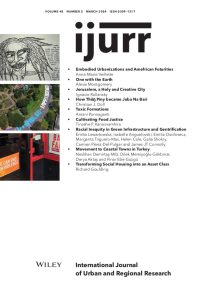This study traces how Black lesbians in the San Francisco Bay Area made a place for themselves in the world at the end of the twentieth century, after the decline of the Black Power Movement and before the rise of the Black Lives Matter Movement. Geocoding and analyzing the content of a Black lesbian journal in the San Francisco Bay Area that had global distribution, the author examines how the placemaking of Black lesbians remade them as cultural-political subjects, expanded their networks, and inspired them to reimagine their relations with the earth. As they crafted cultural spaces across the African diaspora, they faced threats—most notably, street violence, harsh policing and ecological degradation—yet they also experienced joyful interactions with each other, with allies and with nature. The belief grew in their cultural spaces that their liberation required world transformation and that they could change the world. This research, providing a frame for studying the interaction between the making of cultural spaces and the formation of political solidarities, contributes to urban movements research, critical environmental justice studies, and Black feminist/LGBTQ+ research.

